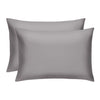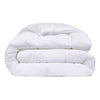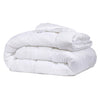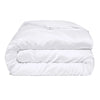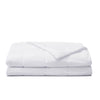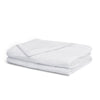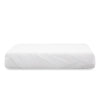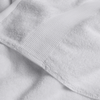The Daily Miracle
Why Do I Sweat In My Sleep: Night Sweats Explained
Published
September 15, 2022
Author
Bridget Reed

A little sweat here and there is inevitable, but during a peaceful night's rest? Well, then it’s totally inconvenient (or downright annoying.)
Some people will sweat more than others, naturally. For instance, some conditions like hyperhidrosis (an overactive thyroid) can cause sweat glands to be hyperactive. Other medications like SSRIs (a class of antidepressants) or diabetes medications are common causes of night sweats.
So, if you find yourself waking up covered in sweat even with the thermostat set as low as possible, this is the article for you. Here are the night sweats explained and some tips for getting better sleep:
What Are Night Sweats?
Night sweats are essentially episodes of excessive or heavy sweating during sleep. It’s completely normal to sweat a little while you sleep — your body changes temperatures naturally throughout the night.
Interestingly, it’s not only sweating; some people can’t seem to get warm enough. Others constantly seek ways to stay cool. Why is that, and what causes excessive sweating?
If you’re drenching the sheets every night, it’s more than just waking up feeling a little too toasty; you might be having true night sweats. In that case, it might be time to consider finding the underlying cause and stop waking up in the middle of the night.
What Causes Night Sweats?
Some night sweats may result from something as simple as lifestyle choices or something more complex like an underlying condition or illness.
Below are five common causes of night sweats:
Elevated Anxiety
Your stress levels can affect everything in your life, even your sleeping. When you’re feeling stressed, bedtime is sometimes the one thing to look forward to — it’s a time to reset after a long day.
However, if your beauty rest is constantly interrupted by hot flashes and night sweats, it can feel more like a task you dread rather than a treat. This becomes especially true if sleep-based anxiety becomes cyclical. If your autonomic nervous system is stuck in flight or flight during the day, you may still experience the effects of this at night.
Mental health is just as important as physical health; speak to your healthcare provider if you need extra support in this area.
Specific Food and Drink
Alcohol and coffee use can lead to an increased heart rate and, in return, a higher body temperature. While a glass of wine or a cup of coffee before bed may be tempting (especially after a long day,) it may be the reason you can’t get the quality shut-eye you need.
Besides drinks, spicy foods are another pre-bed snack associated with sweating at night. Spicy foods are also associated with GERD (gastroesophageal reflux disease).
If your night sweat dilemma doesn’t subside despite your best efforts, it may be time to evaluate your late-night menu.
Menopause
Hot flashes (also called hot flushes) are one of the most famous side effects of menopause but aren’t the only ones. Night sweats are another result of fluctuating hormone levels that can begin in the perimenopausal stage and even continue postmenopause.
Ongoing research shows that estrogen hormone therapy and women’s health supplements can help with various sleep disturbances associated with menopause symptoms.
Sleep Environment
Before making any significant lifestyle changes, you should examine your sleep environment. Not being in the right sleep environment or temperature can be the (quickly fixable) cause of your night sweats.
Naturally, you want your bedroom to be cozy as can be, but you may be toeing a fine line between cozy and downright hot.
Here are our tips for keeping a room cozy yet cool and breathable.
- Dress light.
When you hit the hay, you want your PJs to be light and airy. Opt for moisture-wicking sleepwear like Supima cotton.
- Buy breathable bedding.
Like how your jammies should offer some airflow, so should your bedding. Opt for breathable bedding that will keep you cool all night. If your sheets and comforter are too thick, you might have eight hot (and sweaty) hours ahead of you.
- Sleep with a fan.
You can only put your air conditioner so low before your electric bill gets a little too high for comfort, but sometimes the best way to fix your night sweats is by dropping your bedroom temperature a degree or two more.
Consider installing a ceiling fan or placing an area fan close to your bed to ensure airflow is exemplary all throughout the night.
Other Underlying Medical Conditions
Sometimes night sweats are caused by other underlying medical conditions. If you have any of these health issues, it might be the culprit behind your constant sweating.
- Autoimmune disorders, like rheumatoid arthritis
- Some types of cancers like leukemia, lymphoma, and prostate cancer
- Depression
- Heart disease
- Hypoglycemia (low blood sugar)
- Serious infections, like endocarditis and tuberculosis
- Sleep disorders like obstructive sleep apnea
Ways To Stay Cool at Night
The best way to keep your night sweats under control is by keeping your body as cool as possible at night.
Here are some tips and tricks to help control your night sweats and keep your body temp lower:
Temperature Regulating Comforter
If you suffer from night sweats, comforters can be tricky. You want something that will make you feel cozy, but it also must be breathable enough to keep your night sweats at bay.
Luckily for you, Miracle Made has found a solution — the Temperature Regulating Comforter is just what someone who suffers from night sweats needs.
Expect more fluff and less sweat! This hypoallergenic temperature-regulating comforter will stay cool all night with the power of 500 thread count Supima cotton. This means that you won’t have to fall asleep every night with the dread of waking up in a puddle of your sweat.
Consider Your Mattress
Certain materials are more breathable than others. For instance, your average foam mattress is much less breathable than a spring mattress. Some beds are even made extra breathable (for those hot sleepers).
Your Bedding Matters Too
If you revamp your comforter and mattress and are still soaking through your sheets, it may be time for new ones.
That’s right: your bedding plays a crucial role in your body temperature when you sleep. Certain options like silver-infused extra-luxe sheets are luxuriously soft and keep you cool all night.
Don’t Forget Your Night Wear
When you’re trying to stay cool, every little thing counts —- especially your pajamas. While finding the warmest, coziest bedtime set may be tempting, it probably won’t help your nightly temperature dilemma.
That’s not to say you still can’t find a pair of jammies you love; you just have to make sure the fabric is breathable.
Supima cotton offers a decent layer of protection while still keeping the air flowing. Steer clear of long sleeves or pants, and always try to keep your feet uncovered. Feel free to mosey around in your favorite fuzzy socks or slippers, but come lights out, let your toes breathe a little.
Cooler Nights Ahead
With all this newfound knowledge regarding your pesky night sweats, you'll surely see cooler nights ahead.
We know your sleep's importance, so we try to offer you as many solutions as possible. Some are quick and simple fixes, and others may require a slight change in your lifestyle choices. Either way, we know if you set your mind to it, you’ll conquer this inconvenient issue at hand.
Sources:
Sleep: What Happens to Body Temperature, Brain Activity, and Breathing | WebMD
Hyperhidrosis | ClevelandClinic
More Hot Flashes Could Mean Higher Odds for Heart Trouble | WebMD
Sleep Disorders and Menopause | PMC
Don't Lose Sleep Over Night Sweats | American Osteopathic Association
Foods to Avoid with Acid Reflux and GERD | Healthline
Recognizing and easing the physical symptoms of anxiety | Harvard Health


